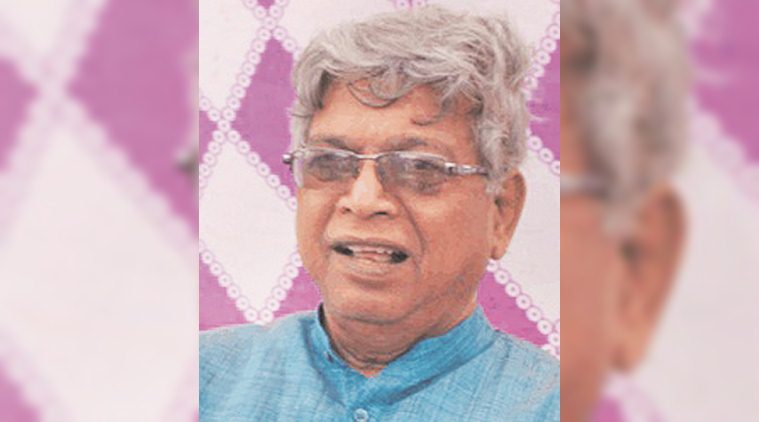
WRITER, ACTIVIST and co-founder of the Dalit Panthers movement, Raja Dhale (78), died in Mumbai on Tuesday after suffering cardiac arrest at his residence in Vikhroli. He is survived by his wife Deeksha and daughter Gatha.
Born in Nandre village in Sangli, Dhale had moved to Mumbai along with his uncle and aunt after he lost his parents at a young age. He studied at the Maratha Mandir High School and lived at the BDD Chawls in Worli.
“Despite difficulty in accessing education, he was very keen on studying. He would say, ‘if Dr Babasaheb Ambedkar could study, what stops me?’” Gatha said. It was during his graduation at Siddharth College in South Mumbai that Dhale began participating in the Dalit movement.
Writer Arjun Dangle, co-founder of the Dalit Panthers that was inspired by the Black Panthers’ resistance struggle for civil rights in the US, said Dhale was a voracious reader from a young age. “At that time, only a certain group of people from Mumbai and Pune would get published for the entertainment of dominant castes. Through his writing, he and others of the group, including Namdeo Dhasal, began speaking about the importance of voices from the Bahujan community, Adivasis, rural areas of the state,” Dangle said, adding that this was shortly followed by the formation of the Dalit Panthers in 1972.
However, it was Dhale’s essay in Marathi weekly Sadhana in 1972 that shot the group to prominence, according to J V Pawar, another co-founder. Amid celebrations to mark 25 years of Independence, Dhale wrote whether the Tricolour was any more than a piece of cloth if India’s freedom did not guarantee dignity for Dalits. His comments came in the wake of several cases of atrocities against Dalits.
Speaking to The Indian Express in January last year, days after the Bhima Koregaon violence that had begun with an attack on Dalits visiting a memorial in the village, Dhale was contemplative. He repeated what he had said to the paper in February 2017 ahead of elections to the Brihanmumbai Municipal Corporation — that the Dalit movement lacked unity. “The Marathas are confined to Maharashtra, and still they feel this sense of power. The achhoot (untouchables),” he said, using the politically incorrect term rejected by most, “are spread all over India, in crores. What would happen if all of us fought together?”
Dhale wasn’t simply alluding to the WhatsApp messages and other social media posts of the time — a call for an uprising against the ‘new Peshwai’ or upper caste dominance. As a founding member of the Dalit Panthers, and also as painter, poet and editor of ‘Vidroh’ magazine in the 1970s, he was also harking back to his own goals from that revolutionary era. He spoke about why young Ambedkarites must read Ambedkar first, and how factionalism and personal interests had affected the movement.
Congress MP Hussain Dalwai recalled those heady days of the Dalit movement. “I was with the Yuvak Kranti Dal, and we had accompanied the Dalit Panthers to a village in Pune where there was ostracism of Dalits. Dhale was with us then. He was fearless, a real fighter,” Dalwai said, calling Dhale’s death a huge loss for the Dalit movement.
For a group of 70-year-olds at Dhale’s Vikhroli residence, he was their first influence towards fighting against caste. “We began as volunteers for the movement through him. There cannot be another Ambedkarite like him,” said Dada Kamble. —With inputs from Manoj More in Pune